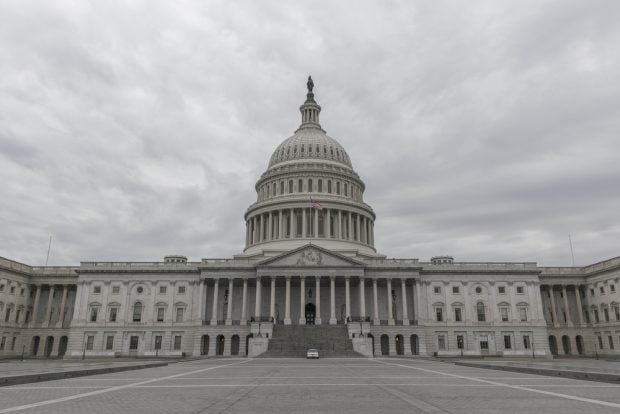 The U.S. Capitol Building
The U.S. Capitol Building
The first major financial regulatory overhaul bill passed by Congress since Dodd-Frank doesn't achieve everything that credit unions want, but it will loosen rules that financial institutions complain are onerous.
On May 22, the House gave final passage to the bill, S. 2155, legislation already passed by the Senate. That bill was crafted by Senate Banking Committee Chairman Mike Crapo (R-Id.) and several moderate Democrats on his panel.
Recommended For You
The bill was far more modest than a bill that was produced by House Financial Services Chairman Jeb Hensarling (R-Texas), but that bill would not have passed the Senate.
The House passed Hensarling's bill with all Republican votes. However, when the House voted on S. 2155, 33 Democrats voted for it.
And while provisions such as changes to the Volcker Rule attracted the most attention, credit unions said the bill will improve the ways they can conduct business.
"This legislation will have a multi-faceted impact on credit unions. It will reduce regulatory burden on small mortgage lenders and free up capital for small businesses," CUNA Chief Advocacy Officer Ryan Donovan said.
The following are several provisions of the bill that NAFCU and CUNA lobbyists said will have a significant impact on credit unions.
Residential Loans for 1-4 Unit Properties
The bill corrects a disparity that hurts credit unions and could free up billions of dollars in economic development capital, according to the trade groups.
When banks make loans for the purchase of a 1-4 unit, non-owner-occupied property, the loan is classified as a residential loan. When credit unions make those same loans, they are classified as business loans and fall under the Member Business Loan cap.
"We estimate that up to $4 billion in capital could be freed up by this simple change," Donovan said.
"Not only will [credit unions] be helped that are up against the MBL cap, but more credit unions will enter this area," Carrie Hunt, NAFCU's EVP of government affairs and general counsel, added.
Minimum Standards for Residential Loans
Another section of the bill states that certain mortgage loans originated and retained in a bank or credit union with less than $10 billion in assets will be considered qualified mortgages under the Truth in Lending Act.
"This provision will help credit unions to lend to more consumers at the margins," Hunt said.
Donovan added, "These changes are particularly appropriate because small, community-based financial institutions like credit unions often have specific knowledge about a borrower's financial situation, and may be able to better meet the borrower's need if they can tailor the loan product."
Home Mortgage Disclosure Act Adjustment
S. 2155 would exempt small financial institutions from certain disclosure requirements under the Home Mortgage Disclosure Act. To qualify, an institution must have originated less than 500 closed-end mortgages or less than 500 open-end lines of credit in each of the preceding two years.
"NAFCU supports strong HMDA protections but does not support the collection of unnecessary data or the addition of regulatory burden," Hunt said.
"This provision would provide much needed relief, particularly for smaller credit unions, which otherwise must undertake significant expense to bring their systems into compliance with a rule that does very little – if anything – to provide credit union members with additional protection," Donovan said.
NCUA Budget Transparency
The bill requires that the NCUA publish its budget and hold a hearing on it before the agency board adopts it.
The current NCUA board publishes its budget ahead of time and holds a hearing, but it is not required to do so under federal law.
"Given that the NCUA is funded entirely by credit union user fees, this transparency and opportunity to provide feedback is highly appropriate," Donovan said.
What's Left Out?
S. 2155 does not accomplish everything that credit union trade groups want, but they emphasized that it is a start.
"This isn't the biggest thing that has ever passed the Congress, but it's big because nothing has passed this Congress," CUNA President/CEO Jim Nussle told CU Times.
"I think it's a very big deal," NAFCU President/CEO B. Dan Berger also told CU Times, but he added, "It's just a bite of the apple. I think other things are possible this year."
Donovan said that legislators had to give in on many proposals to get the legislation passed by both houses.
"Politics is the art of the compromise and this legislation certainly represents a compromise," he said.
Both trade groups favor converting the CFPB into a commission rather than an agency run by a single director. In addition, they also favor data security legislation that would hold merchants to the same standards that financial institutions are held to when a breach occurs.
The bill does not make those changes.
The two groups also are pushing for a delay in the effective date of the NCUA's risk-based capital rule. That provision is included in the House version of legislation to update the Committee on Foreign Investment in the United States.
"NAFCU has always pushed for and will continue to push for sensible relief from CFPB rules, including more blanket exemptions for credit unions," Hunt said.
She added that NAFCU also favors changes to credit union field of membership rules, including a change that would allow credit unions to add underserved areas to their fields of membership.
The two groups are pushing for lawmakers to add regulatory changes to various pieces of high-profile legislation that Congress will consider this year.
"That's what we're working on, yes," Nussle said.
Berger agreed, saying that when it comes to proposals that NAFCU favors, "You use any vehicle or channel to get it passed."
© Touchpoint Markets, All Rights Reserved. Request academic re-use from www.copyright.com. All other uses, submit a request to [email protected]. For more inforrmation visit Asset & Logo Licensing.






